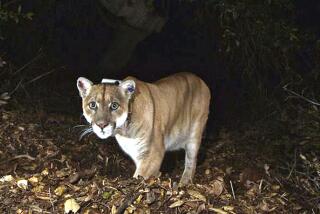Strict Laws Govern Amateur Collectors
- Share via
Paleontology aside, fossil hunters are also required to know the law on hunting and collecting fossils. Basically, fossil hunting is regarded as plundering by federal and state agencies. The law: collecting or even disturbing the remains of vertebrates on federal or state land is punishable by as much as $10,000 and 10 years in jail. Clear enough?
The law means that all of the county’s exotic fossils, from the rhinoceros-like Oredon to the 13-foot-tall imperial mammoth, are off limits to hunters in Los Padres National Forest, Channel Islands National Park, Point Mugu State Park and McGrath State Beach--vast areas of land.
The federal government technically allows the collection of invertebrates, tiny spineless animals like the Ventura County starfish. But then it bans the use of invertebrate fossils for “commercial purposes”--which the U.S. Forest Service defines as “trading” fossils, an activity that is almost inherent in serious fossil collecting.
Beside a desire to preserve fossils, federal officials hope to prevent the land from being torn up by overzealous fossil hunters. “Amateurs are very destructive,” said Steve Horne, Forest Service archeologist, citing petrified wood beds that have “nearly been destroyed” in the Los Padres.
The squeeze on fossil hunters goes back to the 1906 federal Antiquities Act, which grew out of an effort to stop professional fossil hunters from looting dinosaurs bones after the great dinosaur discoveries of the 1880s and 1890s in Utah, Wyoming and Colorado.
While accredited paleontologists doing university research are allowed to use federal and state land--and even search for vertebrates--government agencies won’t issue permits to amateur fossil hunters.
“I think there should be some controls, but I don’t think it’s fair that amateurs can’t collect on public land,” said fossil hunter Ray Meisenheimer.
Fossil hunters say federal officials are off base about them. “As clubs and individuals, we do everything possible to follow the law, but we are being denied the right to pursue our hobby,” Dave Champion said. “The (federal government) has an attitude about us. I even heard (an official) say, ‘Why don’t you just take pictures of the fossils?’ That’s the dumbest thing I’ve ever heard. It’s like telling a brewery to stop brewing and let people just take pictures of beer.”
The state goes even further than the federal government. Removing anything, including invertebrate fossils, is prohibited at all state parks and beaches--children are even barred from bringing home a rock as a souvenir.
Ventura County also has an ordinance against collecting anything from its parks and beaches.
That doesn’t leave much for county fossil hunters. They can hunt on public no-man’s land--road shoulders, freeway underpasses, city properties--or they can find a friend or stranger willing to let them use private land, such as construction sites and mountain ranches. But any rare discovery is likely to be claimed by the landowner.
Fossil hunters have something besides access to worry about.
Notorious pack rats, they often have to build additions to their homes to house the Collection That Ate the Garage. The hobby is that consuming.
“A lot of us have our own museums,” Bruno Benson said. “Fossil hunting can really get to a person.”
More to Read
Sign up for Essential California
The most important California stories and recommendations in your inbox every morning.
You may occasionally receive promotional content from the Los Angeles Times.










